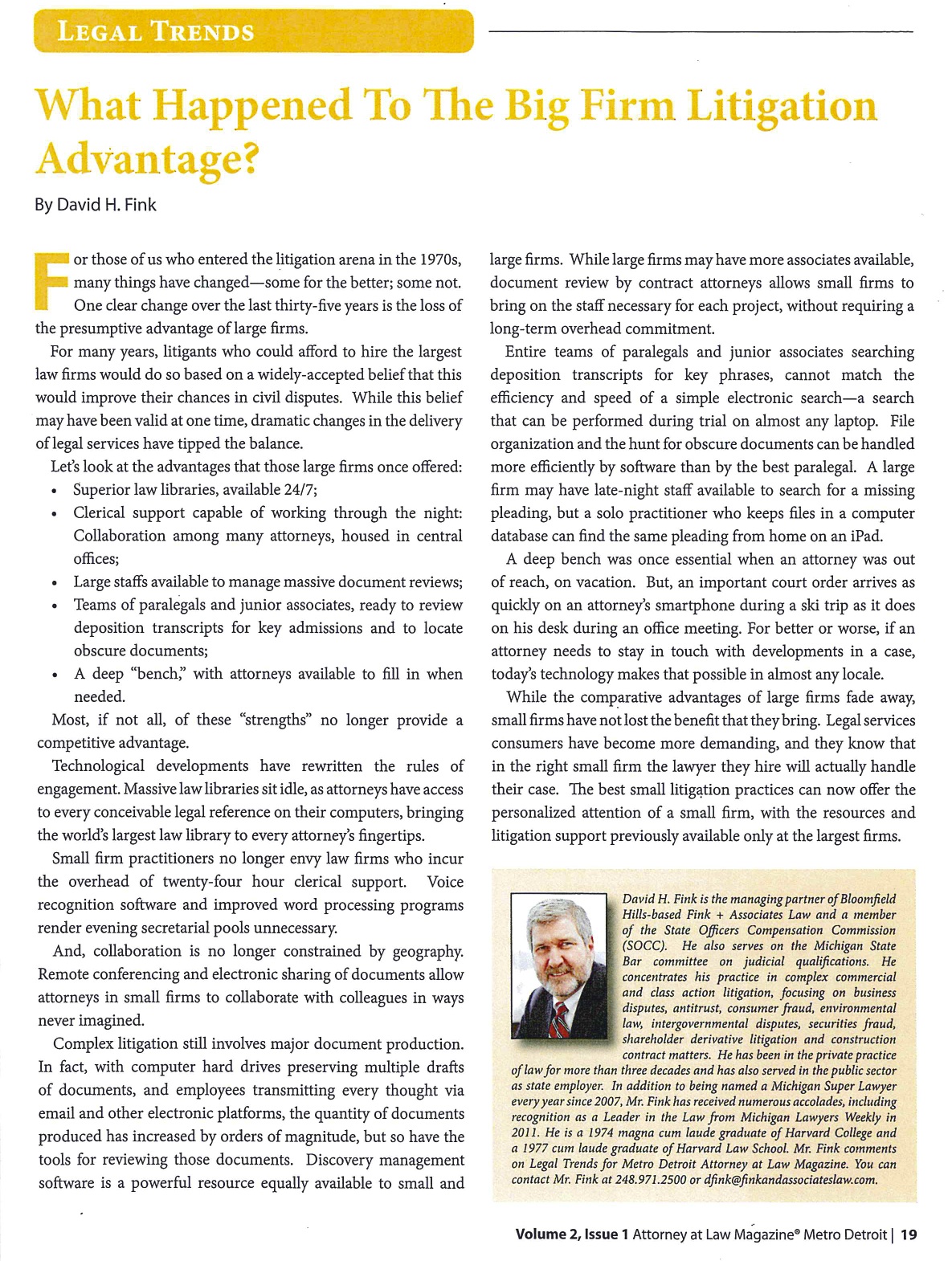In the most recent issue of Metro Detroit Attorney at Law, David H. Fink discusses how technology has leveled the playing field between big firms and small firms. Please click the article below to download a copy of the story, or scroll down to read the text of the article.
What Happened To The Big Firm Litigation Advantage?

What Happend to the Big Firm Litigation Advantage?
By David H. Fink
For those of us who entered the litigation arena in the 1970s, many things have changed—some for the better; some not. One clear change over the last thirty-five years is the loss of the presumptive advantage of large firms.
For many years, litigants who could afford to hire the largest law firms would do so based on a widely-accepted belief that this would improve their chances in civil disputes. While this belief may have been valid at one time, dramatic changes in the delivery of legal services have tipped the balance.
Let’s look at the advantages that those large firms once offered:
- Superior law libraries, available 24/7;
- Clerical support capable of working through the night;
- Collaboration among many attorneys, housed in central offices;
- Large staffs available to manage massive document reviews;
- Teams of paralegals and junior associates, ready to review deposition transcripts for key admissions and to locate obscure documents;
- A deep “bench,” with attorneys available to fill in when needed.
Most, if not all, of these “strengths” no longer provide a competitive advantage.
Technological developments have rewritten the rules of engagement. Massive law libraries sit idle, as attorneys have access to every conceivable legal reference on their computers, bringing the world’s largest law library to every attorney’s fingertips.
Small firm practitioners no longer envy law firms who incur the overhead of twenty-four hour clerical support. Voice recognition software and improved word processing programs render evening secretarial pools unnecessary.
And, collaboration is no longer constrained by geography. Remote conferencing and electronic sharing of documents allow attorneys in small firms to collaborate with colleagues in ways never imagined.
Complex litigation still involves major document production. In fact, with computer hard drives preserving multiple drafts of documents, and employees transmitting every thought via email and other electronic platforms, the quantity of documents produced has increased by orders of magnitude, but so have the tools for reviewing those documents. Discovery management software is a powerful resource equally available to small and large firms. While large firms may have more associates available, document review by contract attorneys allows small firms to bring on the staff necessary for each project, without requiring a long-term overhead commitment.
Entire teams of paralegals and junior associates searching deposition transcripts for key phrases, cannot match the efficiency and speed of a simple electronic search—a search that can be performed during trial on almost any laptop. File organization and the hunt for obscure documents can be handled more efficiently by software than by the best paralegal. A large firm may have late-night staff available to search for a missing pleading, but a solo practitioner who keeps files in a computer database can find the same pleading from home on an iPad.
A deep bench was once essential when an attorney was out of reach, on vacation. But, an important court order arrives as quickly on an attorney’s smartphone during a ski trip as it does on his desk during an office meeting. For better or worse, if an attorney needs to stay in touch with developments in a case, today’s technology makes that possible in almost any locale.
While the comparative advantages of large firms fade away, small firms have not lost the benefit that they bring. Legal services consumers have become more demanding, and they know that in the right small firm the lawyer they hire will actually handle their case. The best small litigation practices can now offer the personalized attention of a small firm, with the resources and litigation support previously available only at the largest firms.


